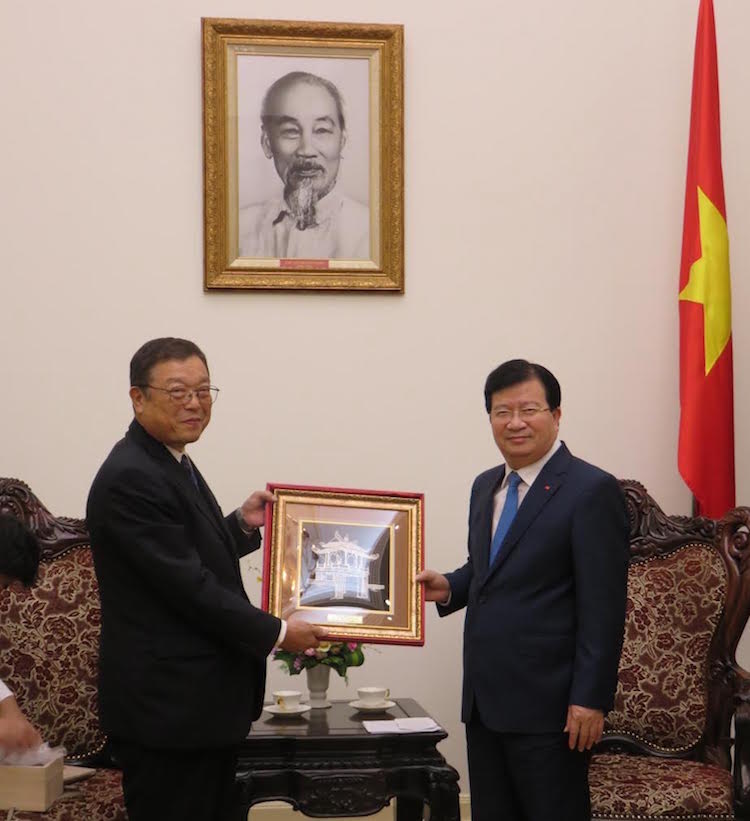By Fumiyasu Akegawa*
This advertorial is part of IDN’s media project jointly with Global Cooperation Council and DEVNET Japan.
TOKYO – After ensuring cooperation from associated government ministries in Japan and United Nations organizations such as the UN Development Programme (UNDP), UN Environment Programme (UNEP), and Food and Agriculture Organization (FAO) as well as the Japan International Cooperation Agency (JICA), DEVNET Japan is in the process of launching agricultural cooperatives in Thailand, Vietnam, Laos, Cambodia and Myanmar – the mainland Southeast Asian countries, historically known as Indochina.
DEVNET Japan is also embarking on a developing country support plan aimed at alleviating poverty, increasing food production, empowering women, introducing advanced technology with a view to encouraging energy saving, promoting sustainable development of cities and providing humanitarian assistance.
In each of the countries mentioned above, DEVNET Japan will help establish agricultural cooperatives (co-ops) similar to those in Japan that supply members with input for production, undertake packaging, transportation, and marketing of agricultural products, and provide financial services. While some co-ops operate in respective municipalities, others include administrative bodies that supervise regional co-ops across several prefectures, run wholesale business in food products and production inputs across municipal and prefectural borders, manage credit unions, offer insurance, and a national headquarters that controls the entire group and manages government relations.
DEVNET Japan will also acilitate sale of agricultural and processed products at what are known as “Roadside Stations” in Japan. A roadside station is a government-designated rest area found along roads and highways in Japan.
In addition to providing travellers places to rest, Roadside Stations are intended to promote local tourism and trade. Shops may sell local produce, snacks, souvenirs, and other goods. All roadside stations provide 24-hour access to parking, public toilets and facilities for sharing information. As of May 2016, there were 1093 Roadside Stations across Japan.
Agricultural cooperatives will also cater to the special needs of mountainous areas yearning for infrastructural development and in major cities with an eye on consumption preferences – in the five Indochina countries.
This would necessitate the provision of multiple facilities such as appropriate storage in freezers in trucks or refrigerators in ordinary warehouses, and milk processing centers yielding butter, cheese and yoghurt. Equally necessary would be facilities where animals such as pigs, goats and chickens for consumption as food by humans.
Such facilities would be expanded in case of need.
DEVNET Japan will start helping build agricultural cooperatives with some 500 members each. The numbers might grow to the scale of 300 million. Starting with the five countries, we will develop a model co-op to be described as UN model.
The fact that there are a large number of followers of Buddhism in Indochina will make sharing of values, cultures and customs with the adherents of Buddhism in Japan. Additional push might come from Free Trade Agreements with Vietnam, Laos and Cambodia to be enforced from April 2017. Subsequent deregulation will provide further impulses.
DEVNET Japan’s Internship Training Program for Foreigners will serve as basis for human resource development of people from the five countries. After having acquired necessary knowhow, they will become trainers back home. In order to avoid any misuse, an independent body affiliated to DEVNET Japan will supervise the dispatch of internship training program.
The supervisory body associated with DEVNET Japan has been involved in storage logistics for about half a century. We have knowledge and know-how of logistics for both storage under normal, refrigerating and freezing temperatures as well as export and numerous quarantine and inspection modus vivendi.
With a view to making necessary preparations for the program to take off, we visited Vietnam in the middle of October. We met with senior officials and enlisted cooperation from Deputy Prime Minister of Economy, vice president of Vietnam Chamber of Commerce and Industry, communist party’s vice chairman in-charge of agricultural community and vice president of VIETJET. (30 November 2016)
Photo: DEVNET Japan President Akegawa with Vietnamese Deputy Prime Minister TRINH DINH DUNG (in charge of Economy) at the Prime Minister’s official residence.
*Fumiyasu Akegawa is President of DEVNET Japan.

